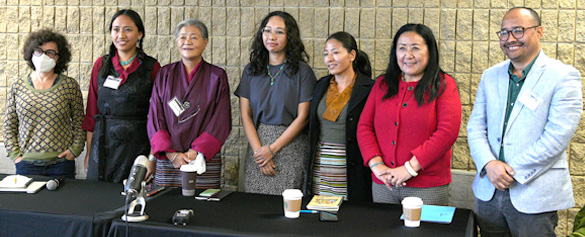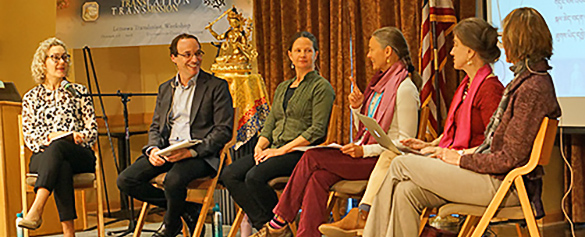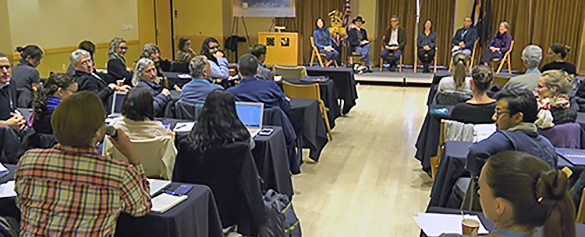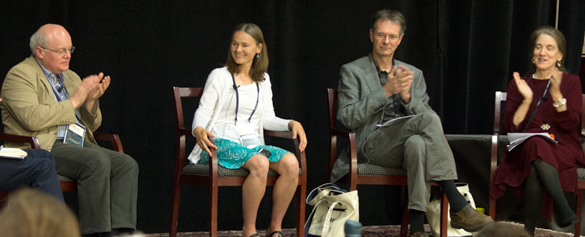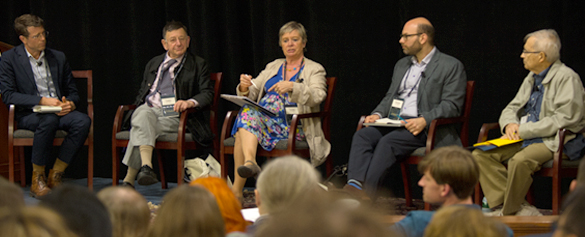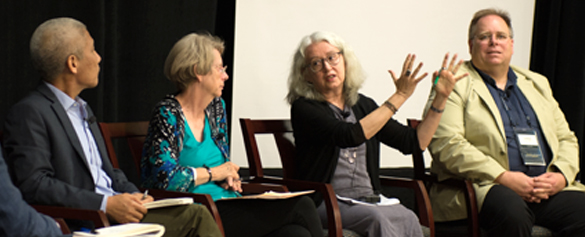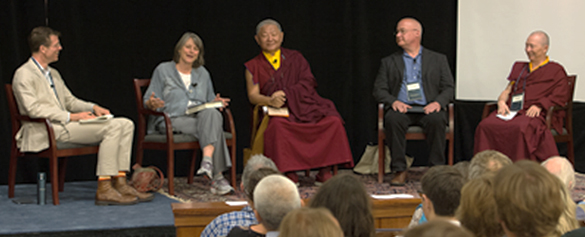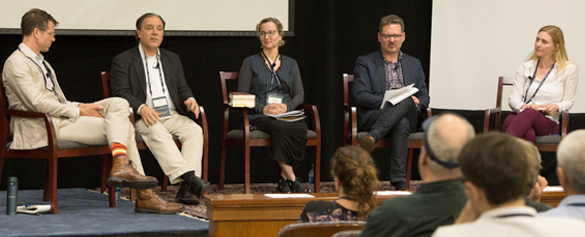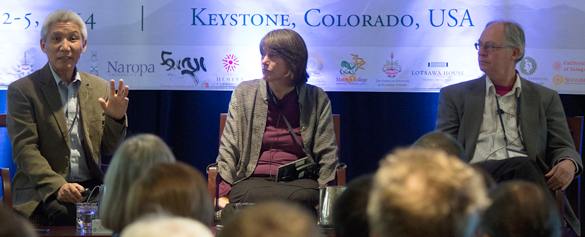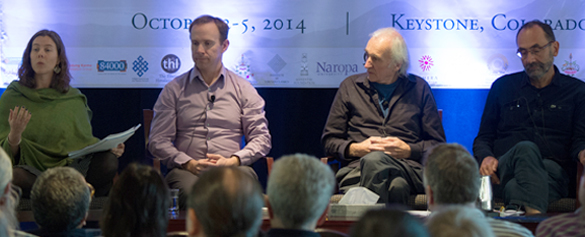Dynamics of Devotion
Migmar Lama2022-11-16T23:40:43-07:00Andrew Quintman (Wesleyan), Lara Braitstein (McGill), Heidi Nevin (Independent), Anne Klein (Rice), Holly Gayley (University of Colorado, Boulder), and Annabella Pitkin (Lehigh) take on the topic of devotion in translation. Annabella Pitkin skillfully facilitates discussion focused on three themes: literary and embodied devotion, translation as an act of devotion, and the cultural translation of devotion. Regarding the first, the group considers what terms are particularly difficult to unpack in English, posing questions like, “How does language serve to dictate devotion?”, and, “How does literature and its utterance help mediate the distance between subject and object?” While translators are positioned as […]
Reflections on the Translation Process
Migmar Lama2022-11-16T23:40:44-07:00Jules Levinson (Independent), John Canti (Padmakara, 84000), Dominique Townsend (Bard), Lama Jabb (Oxford), Sarah Harding (Tsadra Foundation), and Nancy Lin (84000) share their reflections about the process of oral and written translation from some of the first instances of Tibetan language being rendered into English in the United States through the first Lotsawa Translation Workshop in 2018. The discussion weaves through topics like facing the fear of “imposter syndrome” as part of the process of translation, the importance of “kindness to the reader”, and how translators relate to the concept of form. The speakers create a gentle, encouraging, and humorous […]
Translators and Intention
Marcus Perman2022-11-16T23:34:10-07:00This first panel on the first day of the conference addressed questions related to translators and intention and the discussion ranged from Karl Brunnhölzl’s investigation of the art of “non-dual syntax” to Heidi Nevin’s insightful reflections on lineage and why we translate. Wulstan Fletcher of Padmakara Translation Group discussed the needs of target readers and the larger question of why and for whom do we translate, while Anne Klein shared her thoughts on the resonance and sometimes apparent tension between translation and transmission.
Approaches to Translation & Transmission
Marcus Perman2022-11-16T23:34:12-07:00In this session, two world-renowned specialists in the area of translation and translation theory engaged in discussion with Buddhist studies scholars Luis Gomez and Jonathan Gold. Luis Gomez begins the session with a wide ranging and detailed speech on translation theory and practice, including challenges faced by the translator of a family of discourses that try to be both specialized and inspirational, as well as translation into more than one language and what that may reveal about the nature of the “source” and the “target” texts. Jonathan Gold then provides a short discussion of Sakya Pandita’s insights on translation. In […]
Translating: What and How?
Marcus Perman2022-11-16T23:34:13-07:00On the second day of the conference, the nuts and bolts of the craft of translation became the focus and the main questions asked in this session were: What tools are in your translation workshop? What skills should one cultivate to be a good translator? How do we cultivate those skills? Elizabeth Napper begins the session by looking at the perennial issue of literal vs. aesthetic translation from a practical standpoint of needing to adjust to the intended audience of the translation. Thupten Jinpa continues this discussion of the tension between fidelity to the text and consideration of the reader […]
Translations in Transmission
Marcus Perman2022-10-30T21:55:05-06:00In this panel a diverse group of experienced practitioner/scholar/translators discuss the idea of transmission and the use of translations in the transmission process. Sarah Harding discusses the many complications of language that have entered into our understanding of “transmission,” and suggests that we make clearer what we mean when we talk about transmission and limit ourselves to things we can actually talk about. Ringu Tulku presents the meaning of “transmission,” in the context of this conference, as being about the whole system of study and practice. He highlights the importance of khrid over and above dbang and lung. He says […]
The Editorial Process Throughout Creation and Completion Stages
Marcus Perman2022-10-30T21:57:42-06:00In this final session of the 2017 Translation & Transmission Conference, editors from different publishers and projects discuss a number of useful ideas and tools (such as the all important Chicago Manual of Style) that translators who wish to publish their work should know about and pay attention to. Key themes presented in this session are: 1) Types of editors and “editing”; 2) Process/timing of editing; 3) The view of the editor/publisher and the importance of communicating that view to the translator; 4) Translating, editing, and publishing; 5) Editing as integral to translation and transmission.
Translation: Theory and Praxis
Marcus Perman2022-11-16T23:36:57-07:00In this first plenary panel of the 2014 conference, Translation: Theory & Praxis, Thupten Jinpa shares a bit about what Tibetans themselves have thought about and written about translation. Roger Jackson discusses some of the projects he has worked on over the years and gives examples of the problems that translators face. Sarah Harding delves into problems of intention and layers of interpretation, as well as the importance of translation and translators.
Traduttore, Traditore: The Role of the Translator
Marcus Perman2022-11-16T23:36:58-07:00“Traduttore, Traditore” is an Italian adage that means “translator, traitor.” In this panel on the roles of translators, translators of the Tibetan tradition mingle with scholars of Buddhism and discuss a range of topics from the possibility of the invisibility of the translator and the role of real-time interpreters to philosophical ideas about representation.

